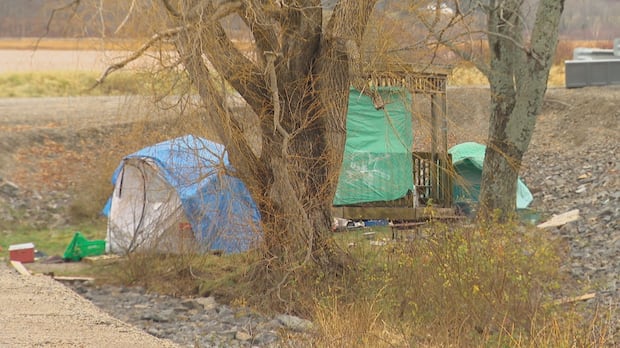Growing rural homeless population facing unique challenges, researchers say
Recent counts suggest issue getting worse in rural parts of Nova Scotia
Homelessness is getting worse in rural parts of Nova Scotia and significant service gaps are creating unique challenges for homeless people and the organizations trying to help them, researchers say.
Two separate counts by teams at Acadia University and Cape Breton University tracked the approximate number of people experiencing various types of homelessness in the western and eastern zones of the province last year.
"I think what this count is telling us is that there's an acute issue that needs a collaborative cross-sector response to house our community members in more dignified ways," said Mary Sweatman, an associate professor in Acadia University's department of community development.
Both counts revealed a significant increase in the number of people living without permanent shelter since this type of data was last collected, as well as an increasing strain on the organizations that support these individuals.
Last year's western zone count, which was expanded from previous years to include the South Shore, was done in response to requests by these organizations for updated numbers, Sweatman said.
"They really wanted an outside organization to prove what they were seeing anecdotally and that is that there is a rising concern of homelessness in rural Nova Scotia," she said.
Numbers are an underestimation
At least 672 people were experiencing homelessness across western Nova Scotia. That's up from the 231 recorded in a 2022 count.
The western Nova Scotia count was based on information collected in November by 47 organizations.
Staff completed anonymous surveys with people who use their services and then shared the results with the researchers.
The count included people living outdoors, in emergency shelters, with loved ones or friends, or individuals who are at risk of losing their housing.
The latest count covers a larger area than previous ones, so Sweatman isn't surprised the number is higher. But she said it's still an underestimation of the overall problem.
"Because it only counts those that have access to services and so we know we're missing people and that's an issue," she said.

The western zone count was modelled after similar research done in the eastern zone, Sweatman said.
Cape Breton University has been tracking homelessness in that part of the province since 2016.
The latest count was conducted last July and found 254 people were homeless in rural Cape Breton and surrounding counties.
"We saw a 72 per cent increase in homelessness in these rural parts of the eastern zone since 2021," said Catherine Leviten-Reid, an associate professor of community economic development at Cape Breton University.
The challenges facing homeless people in rural areas are similar across the province, according to the researchers.
In addition to a lack of affordable housing and shelters, they said there are service gaps from community to community and transportation barriers for people to access support.
"If I look at research projects in other parts of the country on rural homelessness, the conclusion is that these people just go without services," said Leviten-Reid.
Trading sexual favours for rides to appointments
The increase in homelessness and a lack of support are adding more pressure on front-line organizations.
"The impact on those of us in this work is huge, but also that just speaks to the impact on the people who are living it," said Kimm Kent, director of the Windsor, N.S.-based Peer Outreach Support Services and Education, or the POSSE Project.
Many people working for organizations that help vulnerable people go on long-term leave because of what they experience on the job, she said, which creates even more strain on services already at the brink.
Kent was working to find a permanent home for a man before he was found dead in a tent in November, while the western zone homelessness count was underway.

The results of the counts legitimize the work done by organizations like POSSE and the need for sustainable funding from all levels of government, Kent said.
Decentralizing services in rural areas is essential to helping people who are homeless instead of expecting them to travel significant distances, she said.
"I know people who have to, like, exchange sexual favours for rides to their medical appointments and that shouldn't be a reality of rural Nova Scotia."
Opportunities and Social Development Minister Scott Armstrong was not available for an interview, according to a spokesperson.
In a statement, the spokesperson said "these counts provide important local insight, especially in areas where real-time system data is limited."
There are currently 30 housing support workers in communities outside of Halifax Regional Municipality, 148 shelter beds across eight rural communities, 180 supportive housing units and 55 units at shelter villages in Kentville and Sydney, the statement said.
"We recognize demand has increased and are working with service providers to address this."


